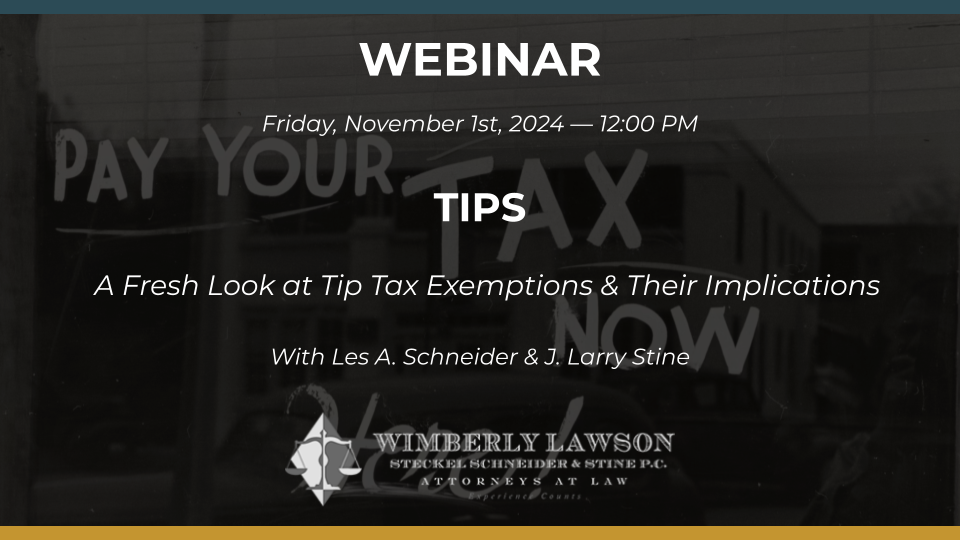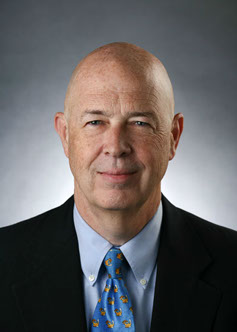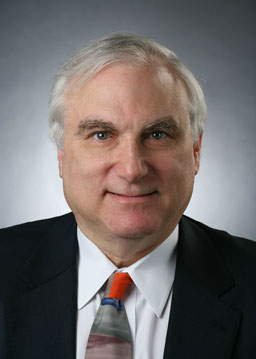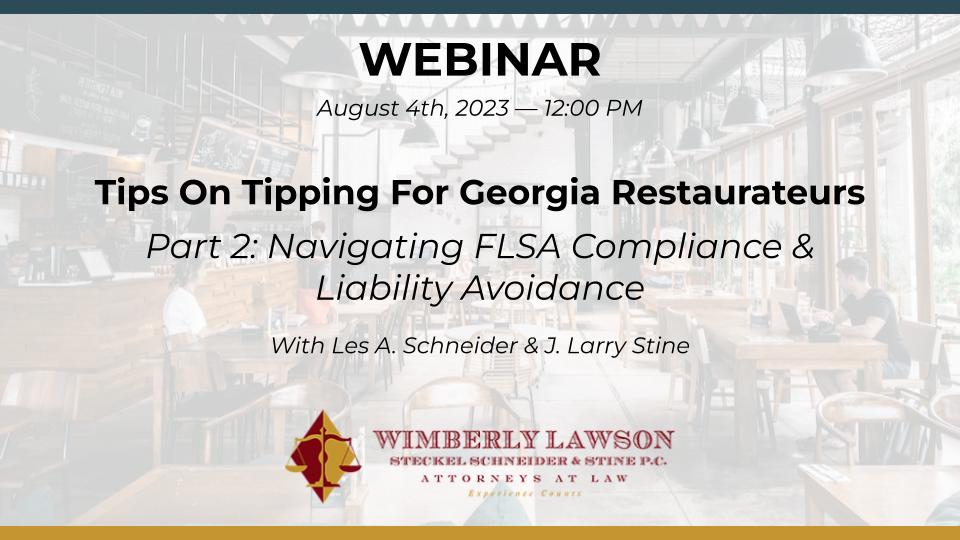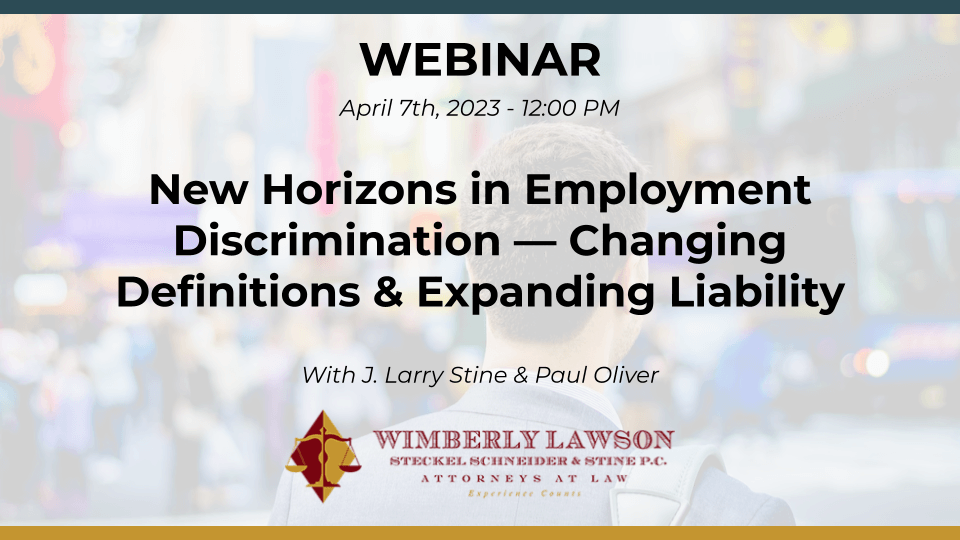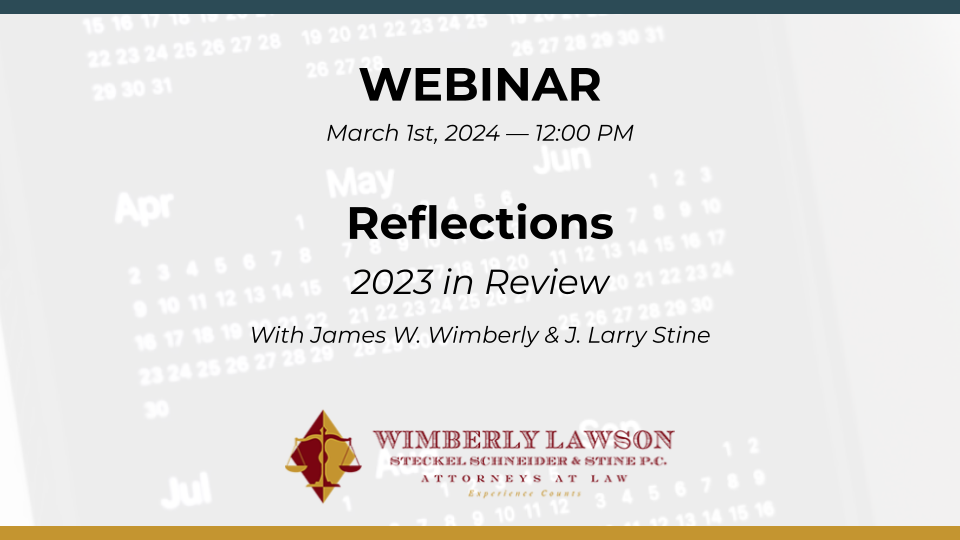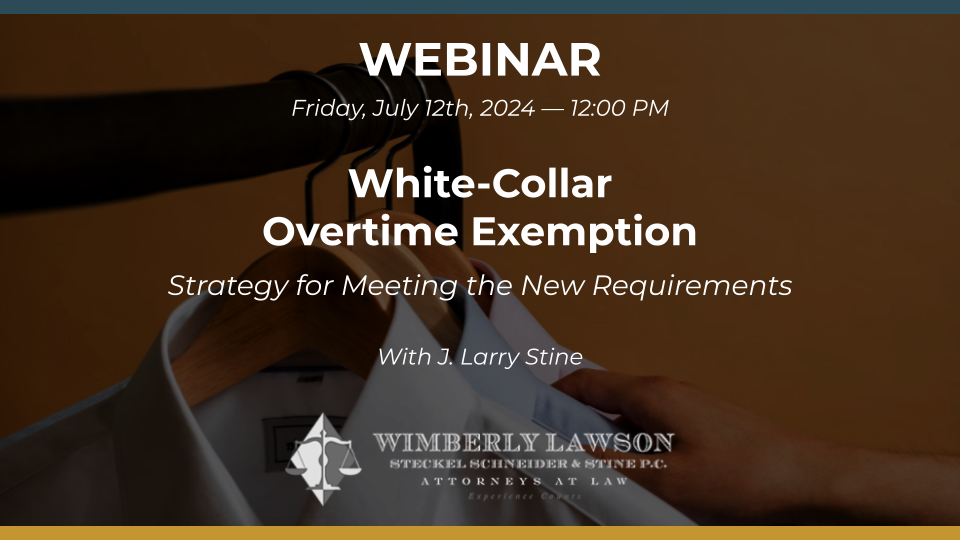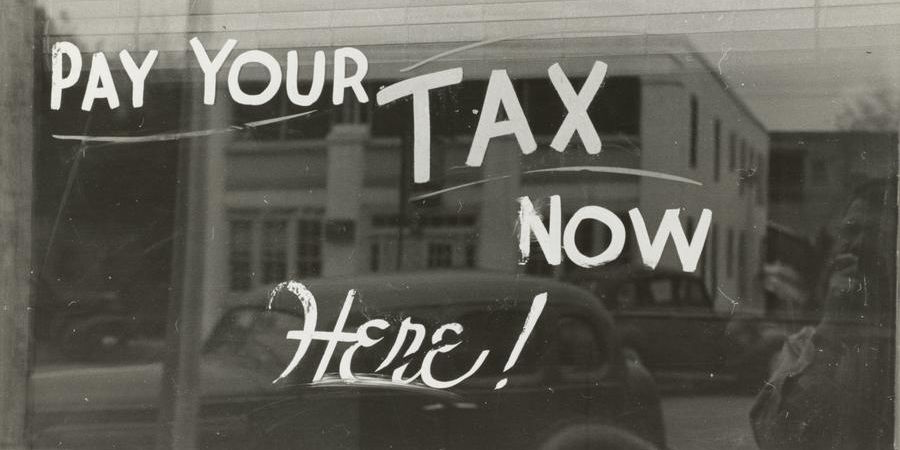
TIPS: A Fresh Look at Tip Tax Exemptions & Their Implications
Have we reached the “tipping point”? Both Presidential candidates proposed to exempt tips from tax, and a Texas court just invalidated the Biden Administration’s revamped rules on the FLSA’s tip credit exemption. So, it’s a good time to take a fresh look at this question, considering not just the law, but also the practicalities. Our partners, Larry Stine and Les Schneider have worked extensively with clients in the hospitality industry and will explain the status quo, make predictions, and of course entertain your questions.
Watch This Webinar
Webinar Transcript
Les A. Schneider (00:00):
Good afternoon. My name is Les Schneider and my partner Larry Stine and I today are going to talk about tips, a fresh look at tip tac exemptions and their implications. So we all know today that tipping has changed to when Larry and I were much younger and had a lot more hair on our head. It, it was used to, it wa you got tips largely by cash. It was easy to evade any kind of tax reporting and most tips today, now, especially in restaurants, are by credit card. And obviously that's much easier to track and also to tax. Perhaps it's not surprising that the US Department of Labor's rules for tips and tips, credits and tip pooling tip back and forth between whatever administration is, is in power. Although that may be an unfortunate fallout of politics, it's the reality that we deal with today, but the election just days away.
Les A. Schneider (00:59):
Let's take a look at recent vacillations and try to predict, predict what the tipping point is actually gonna be. We're gonna cover three topics for you today. Proposals to exempt tips from taxes, the rules and challenges to the rules were go governing a tip, credit and tip pooling itself. So we start out, and if you all have been watching the campaign obviously back on June 9th, 2024 at a rally in Las Vegas Donald Trump declared that if he was elected, he would exclude tips from taxable income for workers whose pay in part depends upon the kindness of strangers IE their customers On August 10th, 2024. Also in Las Vegas, Kamala Harris endorsed the same policy, obviously trying to ingratiate themselves to the same community in, in Nevada that relies a lot on tips for people's income. Well, is this a broad consensus between Mr. Harris and Mr. Trump? Not on your life.
Les A. Schneider (02:10):
It's all done for politics and who they think they can get to vote for them in a few days or have already voted for them based on this proposal. The pros of this concept is the, if you go back to the Reagan Office of Management and Budget, they actually call this proposal sheer genius. Senator Cruz, who's up for reelection fight, has introduced a bill in the Senate, which exempts tips from tax. This bill entitled The No Tax On Tips Act would create a hundred percent above the line deduction for cash tip income, meaning payments made using physical currency, debit or credit cards, or checks. These non-cash tips like tickets or coupons presumably would remain taxable. And both cash and non-AP cash tips would still remain taxable under the payroll tax in the house. Representative Byron Donalds, who's a Republican from Florida, introduced an a companion bill outlining the same concepts, a different house bill by representative Thomas Massey, a re Republican from Kentucky, and Matt Gaetz, Republican of Florida, and entitled the Tax Free Tips Act of 2024 would exempt tax tips from both the income and the payroll tax. So they're obviously upping their game on that issue. Larry, give us some of the, that's the pros of this concept. What are some of the cons?
J. Larry Stine (03:54):
Well, some of the cons, one of the cons on it is that depending on which bill, let's, let's use the one that is exempting the payroll taxes we're talking about Social security, Medicare type taxes. The FIA taxes, that's actually a big business tax cut to the employers because what happens with the way one of the bills sets up is the income tax is just taken by the individual employees against the income tax. But on the other hand, they're still paying 7% of the fica. There's a matching of 7% by the employers. And so if they exempt the payroll taxes, then the employee gets to save 7%. But so does the employer. So it's a bigger tax cut than when you, you, you do that and, and some of the smaller operations, the employees, unless you're at, you know, high tip places are already at a point they don't pay income tax.
Les A. Schneider (04:56):
So you would agree with me, Larry, that clearly the IRS would certainly be against this proposal and expect to lead the opposition against it.
J. Larry Stine (05:08):
We, yeah, I I think the I RSS can counted on anytime there's money to be had, they're gonna be on the side of taking it from the taxpayer.
Les A. Schneider (05:16):
Right. So I think that gives us kind of the pros and cons of where we are. There is a, in January, 2024, the IRS introduced a voluntary program that was entitled the Service Industry Tip Compliance Agreement for Reporting Tip Income designed to integrate the point of sale systems that predominate in restaurants to date. And I think all of us see how many co businesses are cash free now and everything is going through a credit card, including tips. Therefore, clearly the service has an advantage now where they can come up with a much more accurate number on how, how, how many tips are being paid to tipped employees and what the proper tax should be for them. And it is doubtful that the government would actually give up on that kind of income tax income. Well let, we're gonna switch over now to the tax credit that exists in the law. So Larry, why don't you start off and, and tell us who are the people who are eligible for tip credit and what is that tip credit and how does that work? Okay.
J. Larry Stine (06:35):
The eligibility, believe it or not, is because the ACT is so old. A tip credit person is a person that gets $30 in tips. That is such a low amount of money that it's really doesn't make any sense, but it's been in the statute so long. So employees who earn $30 in tips can be eligible for the tip credit. And what the tip credit is, is right now the minimum wage, the federal minimum wage is $7 and 25 cents. Tip credit would allow you to pay $2 and 13 cents an hour instead of 7 25. But there is a whole line of conditions and requirements to obtain that two 13 payment as opposed to 7 25. You have to notify them that you're gonna be taking the tip credit. So there's a notification provision. There is a requirement that the tips at least exceed the remaining $5 and 12 cents in tips that you have to get the, in March of 2018, they admitted the act that says the tap, the tips are the property of the employee. But if you want to use a tip pool, now you have all these requirements as to the tip pool. The tip pool can only have people who are proper recipients of tips. And so you could not give money, for example, to a dishwasher. You could not give money to the people who are in the back cutting up the vegetables basically, or the
Les A. Schneider (08:13):
Chef for that.
J. Larry Stine (08:14):
The, the, the back of the, the back of the house is off limits. The managers and the supervisors are off limits. What we're experience, and a lot of the litigation we're having on the tip credit is they are so many requirements that a lot of the restaurants just don't do 'em. Right. For example, one of the easiest ones that the P is bring across is the notification because it starts off, right? Mm-Hmm <affirmative>. But what happens is the managers get busy, the employees are coming in or previous tipped employees, they know what the tips are, the manager knows there's the tips, the tips, and so they just kind of don't bother with this proforma notification in their minds. And then they get sued later on for not giving the notification
Les A. Schneider (09:04):
And that disqualifies them from getting that debt tip credit of the five 12 an hour. Right?
J. Larry Stine (09:10):
All of a sudden you're now paying 7 25 an hour or, and you now owe another $5 and 12 cents on all the Fair Labor Standards Act. Because this stuff is so well known to the restaurant industry, courts are very likely to do liquidated damages. So all of a sudden now, instead of paying 'em $2 and 12 cents, I now I'm gonna be paying 'em another $10 and 26 cents an hour
Les A. Schneider (09:35):
For the mistake that they made
J. Larry Stine (09:37):
For the mistake they made. And that's a big hit when you start thinking about, I, I now have increased my labor cost for my service employees fivefold,
Les A. Schneider (09:48):
And if I wanted to, instead of being worried about meeting, jumping over all the steps and doing all the get jumping over through all the hoops to get it right. The employer has a couple of options, right?
J. Larry Stine (10:02):
They do, they
Les A. Schneider (10:03):
Do. The first option of course, as you've talked about, is they can pay the two 13 an hour and try to take the five 12 per hour with tips that the servers or the tipped employee is getting. On the other hand, if you are a businessman and you run a restaurant, one of the things you could do is be concerned not only about the people in the front of the house, you're tipped employees, right? But the people in the back of the house and for that matter, your managers and other folks. So if I wanted to put, whether I call it a mandatory tip or whether I call it a service charge, and I, I put that on the check of my customers, right? Then all of that money that I'm taking in, I can use to distribute that across my entire workforce. And that way I don't worry about a big notice provision. I don't have to worry about the tip credit or anything like that. I come up with a 7 25 per hour or whatever hourly rate I want to do above that, right? And then I will distribute the rest of that money across my workforce to even out the needs of my chefs, my dishwashers, and my service.
J. Larry Stine (11:27):
That that is correct. And, and in fact, you set it up like a commission,
Les A. Schneider (11:31):
Right?
J. Larry Stine (11:32):
So I've got a mandatory service charge or a mandatory tip, whatever language they want. It's mandatory. So it's not really a's not a, it is not a voluntary tip
Les A. Schneider (11:42):
And it's really part of the check, it's part of the cost of eating at that restaurant, right?
J. Larry Stine (11:47):
So what happens is if I set it up as a commission mm-hmm <affirmative>. I can actually qualify the servers from being accepted from overtime payments under Section seven I of the Failure Standards Act. So as long as I, the commission exceeds 50% of the compensation, the compensation, it least exceeds time and a half. The minimum wage was about $10 and 38 cents. They're exempted from overtime so they can work all the overtime they want. And basically what happens is that this commission, if you do it, is getting about the same income
Les A. Schneider (12:24):
And you, and not only income to those tipped employees. Yeah. But you're also giving more income to the rest of your employment force. So everybody has the incentive to work together to be able to create perhaps, a better system for the day-to-day operation of that restaurant. Yeah,
J. Larry Stine (12:43):
Absolutely. So it, so, so you can actually use the money to back to the other house, back of the house however you want. Right. They can actually go to managers and supervisors under that system, but you can't under the other two systems.
Les A. Schneider (12:54):
Exactly.
J. Larry Stine (12:55):
So, and, and it helps particularly in larger operations. Part of the problem is that this tick credit has been around so long, I mean, it's been around 12, 12 years I believe, so that the tips have gotten bigger and bigger and bigger and bigger and bigger.
Les A. Schneider (13:10):
Right?
J. Larry Stine (13:11):
And so what's happening is if the money goes to the servers, you're, you're beginning to have some of this disproportionate impact on restaurants at the front of the house is making more money than the back of the house, including the chefs.
Les A. Schneider (13:22):
And nowadays with using, as we talked about earlier, credit cards to pay in the old days, maybe a restaurant would have 50% of its sales paid in cash and maybe the other 15 credit cards. Nowadays it's probably more like 90 10 in favor of credit cards, et cetera. And then we all know when we put our credit card into that machine, it basically says, well, would you like to give a tip? And it's 20% and higher to go to your point, right? But if in fact there is a, what we'll call a service charge or a mandatory tip, whatever we want to call it, we know at that point that that money can be free and clear for the employer to determine how much to give to the entire restaurant staff.
J. Larry Stine (14:11):
Right? There, there, there, there are no ki rules applied anymore except for if maybe somebody leaves a little voluntary tip that just goes to the,
Les A. Schneider (14:20):
If anybody ever finds out about it <laugh>, which is the other irony of what goes on in, in today's world.
J. Larry Stine (14:26):
Or if they add an additional tip where you know they got an 18% and they like the service and they write, oh, I'm gonna give 'em another 10 bucks. Right?
Les A. Schneider (14:34):
And that,
J. Larry Stine (14:34):
That goes to the server because the, and the March of 2018, and then it's, those tips belong to the server.
Les A. Schneider (14:41):
But if you're paying your server at least seven and a quarter an hour Yeah. As opposed to the two 13, right? It just doesn't matter.
J. Larry Stine (14:50):
And this scenario, it, it, it, I think it doesn't matter because you got the mandatory, but I would give the tips to them 'cause it's gonna be a very, very small
Les A. Schneider (14:59):
Part. I agree. Giving it to them, but it's not as a matter that's going to bring in a lot of overtime or anything like that. No. And because of what you talked about with the seven I exemption, you've almost done a lot to eliminate a lot of overtime obligations anyway.
J. Larry Stine (15:15):
Yes, you have.
Les A. Schneider (15:17):
Alright, so we have the fact that the world may be changing. The one thing we do want to point out to our listeners today is the fact that in some states, Georgia being one of them, if you have a mandatory tip or a service charge the local department of revenue in Georgia will take the position that sales tax needs to be factored in on that service charge tip. So don't forget to add the six or 7% sales tax when you're totaling the check because that since it's part of the food order, et cetera, that we are in a situation whereby sales tax may be owed. And if you don't collect it at the time of the sale, you, the employer will be responsible to pay that tax to the state if you are audited accordingly. Again, there's a lot of give and take here, but as Larry pointed out in the beginning, if you don't make all the steps correctly when you're trying to take the tip credit, then you're gonna end up with a lot more liability anyway. So you have to pick your poison as to what the best situation is. Larry, why don't you talk a little bit about the fact that the Department of Labor, you know, had its rules and some of those rules were overturned by the courts and really where are we today as to the regulations when it comes to tips?
J. Larry Stine (16:48):
Okay, so basically what's happened for a long time, the Department of Labor had what they used to cover all the 80 20 rule. And so under the 80 20 rule, which was basically guidance to restaurants for tipped employees to make certain they're doing it, what they said is that 80% of their time needed to be reflected in tip generating <inaudible>. And that 20% of your time could be non tip generating activities. And honestly, it was a guidance. And so the courts would look at it holistically, overall, they'd look at it as an 80 20 and it was a tip generating. So that was a workable rule. But what happened is the Department of Labor depart labor decided to put it into a regulation and it became the 80 20 30 rule. And they changed the nature of the, the analysis. So instead of it being kind of tip generating work, that 80 20 ratio, they define it as activities that directly impact tips.
J. Larry Stine (18:06):
So they made distinctions, for example, I think under the old thing is you're out there making tea as a server. Well, that's a tip generating activity, right? 'cause You're making tea that you're gonna serve to them. But under the new proposed regulations, they would say, well, that's not directly generating tips. And so it goes into the 20%. The other thing that they did, what the old way it worked was if you did that 20 basically that time that was involved, that you had to put 'em into a 7 25 job. So, but they did on this one is you violated the 80 20 rule, you lost the entire tip
Les A. Schneider (18:47):
For the entire week.
J. Larry Stine (18:48):
The entire week you lost it. And then the, the 30 was a rule that you could only do non tip generating activities 30 minutes before the shift, or 30 and 30 minutes after the shift. So if you got past 30 minutes, even if it didn't exceed the 80 20, that became a dual job and you owed the minimum wage, the, the, the problem.
Les A. Schneider (19:12):
So it becomes an accounting nightmare and a timekeeping nightmare for the employer, which starts to make the entire view of the tip credit just, it, it the squeezing isn't worth the juice anymore. Correct.
J. Larry Stine (19:26):
And, and, and part of the problem sometimes is the regulations and the, the interpreted bullets and the guidance are done by bureaucrats in DC who've never really ran a guy during restaurant in their life. Right. And they're sitting around a table doing it. And so what happens is they begin to, to make distinctions that make no sense. Like rolling silverware is a non tip generating activity by their definition. But ev every restaurant I've ever been in, I know the, they, they roll silverware,
Les A. Schneider (19:53):
Right? And that's a non tip generating activity.
J. Larry Stine (19:56):
That's what they were clung this one. But it's, it's one that's related to chip generating. 'cause It's nice to have your silverware done and your tee there. So it, it was a difference. It it went to the Fifth Circuit mm-hmm <affirmative>. And the Fifth Circuit basically said that what you did is you changed what the statute says. The statute talks about tipped employees. And what they said is they've now changed it to a tipped occupation. Right. So, because the problem is that tipped employees is somebody who generates $30 in tips. Right? And so they started basically looking, it looked like to a lot of people that they were legislating very fine details, but frankly didn't make a lot of sense to restaurateur. Right. and, but it made a lot of sense to plaintiff's attorneys. I already had one lawsuit already filed based upon this regulation. And it would be of difficulty because it looks like most restaurants would've a real trouble with this 80 20 30 rule with this type of analysis
Les A. Schneider (21:01):
And being able to administrate it in a way that doesn't end up getting them in trouble as to whether or not they qualify for the tip credit or not. Right.
J. Larry Stine (21:10):
And, and it makes it very difficult for them to, to know in advance with some certainty whether they could do that or not. And of course, you know, you don't wanna find out in litigation, you wanna find out ahead of time. Right. So what happened is the restaurant Law Center sued the DOL and it went back and forth and up and down. But what happened eventually is that the Fifth Circuit Court of appeals in the restaurant Law center versus DOL on August 23rd, 2024, and validated the regulation. And so the regulation is no longer instead. And and part of it was because they tried to make the distinction between a tipped employee and a tipped occupation. They put this 30 minutes in that had never been in there before. They tried to argue, well, we've visited 2030 all along. And they basically said, just because you've been doing it all along doesn't mean you can legislate it. Right. Basically. And then the other problem is this is the point in which the overruling of Chevron came into play,
Les A. Schneider (22:14):
Which was, which was the case that basically attacked legislation by administrative agency as opposed to legislation by legislators. Correct.
J. Larry Stine (22:25):
Lo the Loper Bright case. And basically they started saying, no, you don't get the legislate and write these rules and to, to this degree and we're not gonna defer, we're gonna look at the statute. We're going back to the old days when we the courts did this and not didn't let the executive
Les A. Schneider (22:43):
Branch. And now there's a real lack of deference to administrative opinion of either law or regulation where the courts are taking a fresh look at what they think the plain meaning of the words are. And even in cases of ambiguity, they don't have to defer to what the administrative agency did, whether it's the Department of Labor or any other administrative
J. Larry Stine (23:06):
Agency. Yeah. Correct. They, they eliminate that ambiguity standard. I mean, so basically under Chevron, you look at ambiguity and then you would defer to them as long as one, the interpretation was one of the reasonable interpretation. And that Chevron doctrine was taken a long way. I I literally had a case in which the 11th circuit deferred to the brief as the administrative proceeds right. Under Chevron, which I think was a stepped far, but the courts were going that, and this was the 11th circuit, right? This, this wasn't the ninth circuit or Right. Second Circuit, which are more liberal. This was one of the more conservative circuits saying, no, we're going, I'll put it in a brief that's, we're gonna defer to it on the Chevron because it was the ambiguity that's thing gone. Right. now you can still go back to your long historical positions, but that is just a factor to look at. And that's, in fact what they said in this one is, look, you know, you've been doing it since 1988 by the way the tip was in the statute from sixties. Right. but we're not, we don't have to, it doesn't have a power to control. It only has power to persuade. And because of that, that 80 20, 30 rules and validated what's in this place is going to have to be subject to a lot of litigation over the the tips.
Les A. Schneider (24:23):
So it's either litigation or we need an administration that's gonna simplify the process as to who qualifies as a tipped employee and what has to be done in order to make it clear what an employer has to do to make sure they qualify for the credit without going so granular that they're gonna trip up on one of the number of elements they're gonna have to meet today. Yeah.
J. Larry Stine (24:52):
And, and, and what I think a lot of the restaurants need to do is this statute has been in a play that the five 12 is, I think now what they need to do is do an analysis
Les A. Schneider (25:03):
Mm-Hmm <affirmative>.
J. Larry Stine (25:04):
And, and am I really, the amount of tips that I can come in or control either is a tip pool with a 7 25, which is the third choice you can have. You can be at 7 25 and you can have a tip credit tip pool that now I can give to the back of the house except for the managers and supervisors.
Les A. Schneider (25:24):
And that was the point I was going to ask you about, Larry. So in other words, if I get to the point where trying to get the five 12 tip credit is just more trouble than it's worth. So I decide that everybody who is a server is gonna get seven and a quarter an hour. Right. But I'm gonna have a tip pooling situation and whether the tip pooling situation is mandatory or permissive, all the money is gonna go into a particular pool. Yes. They get there seven and a quarter an hour or higher whatever, whatever. And that goes for the back of the house, the front of the house and eat. We, there's a, there's a certain amount of money that goes into this pool. If I've done that seven and a quarter an hour at least that minimum wage, and I take that money, I can divide that money across my entire restaurant. And I'm not,
J. Larry Stine (26:23):
Except for the supervisors and the managers,
Les A. Schneider (26:25):
Except for the supervisor and the managers. And I'm not going to get into, I'm not going to get into the cross hairs about I'm not in compliance with wage an hour. Right. And
J. Larry Stine (26:34):
You reduce your liability
Les A. Schneider (26:35):
And you reduce the total liability
J. Larry Stine (26:37):
Because you've already now built in the 7 25. So there's not gonna be that, remember that $10 and 36 cents if you screw up on the two 12. Right. That's gone away. The only thing that you're looking for at that point is if the tip pool is correct and where the tips need to go back. I mean, so your liability could be you don't, if you give the, say you give the tip pool to managers and supervisors and validate the tip pool right now, it's just a recovery of the tips that,
Les A. Schneider (27:01):
And if I don't want to use a tip pool and I do want to a apply to everybody including managers and supervisors, now I have a mandatory service charge. Correct. That could go to everybody. Correct. But if I want to use the tip pool, it's as wager now it describes I have to preclude managers and supervisors, but I can provide money to the people in the back of the house, the chefs, the dishwashers, et cetera. So long as everybody is getting at least seven and a quarter an hour for the first 40 hours. So Larry, what happens when I have a waiter or a waitress or a server, we call them now politically correct. And that person works 45 hours, so they're getting the seven and a quarter for the first 40 mm-hmm <affirmative>. The next 41st through 45th hour. What do I have to pay the hourly rate for those people, even if they are in a tip pool?
J. Larry Stine (28:00):
If they're in a tip pool at 7 25 with that tip pool, luckily the tips don't go into the regular rate.
Les A. Schneider (28:07):
Right. So therefore the overtime rate would be seven and a quarter times one and a half. Correct. And that's the way you would handle it. And that would be the end of it. Correct.
J. Larry Stine (28:17):
And he would not end up with, a lot of times the overtime restaurants get confused and they pay time and half on $2 and 13 cents, which is not correct. And so you have another violation under the Fair Labor Standards Act. And of course the problem with even small violations of the Fair Labor Standards Act is the statute of provides attorneys
Les A. Schneider (28:34):
To be paid. It's like the movie, the blah, it keeps moving and moving and getting bigger and bigger. Yeah.
J. Larry Stine (28:40):
And, and, and the big issue then becomes that the attorneys on the on there, there, theirs get bigger and bigger and bigger and bigger. And that's the problem.
Les A. Schneider (28:50):
Okay. All right. So there's different types of tip pooling as we've talked about. Whether you want to include the back, just the back of the house with your servers or whether or not you wanna do the, just the servers or whether you want to use the servers, the back of the house and managers and the supervisors, there's three options here. Correct. And that's what an employee, a a somebody in the restaurant business really as you say, needs to do an analysis as dollars and cents. What comes out best for the overall operation of the business, what comes out best, what's gonna create the best staff because to have coordination between the back of the house and the front of the house and a restaurant is very critical. Your food comes out improperly cooked food comes out late, they, they're not gonna, they're probably in all likelihood, not gonna blame it on the cook.
Les A. Schneider (29:51):
They're probably gonna take it out on the server. Yep. And the server may get it tipped. It's not reflected for as much money as they would like. So we have this dichotomy of really, as you would call Tony restaurants fairly expensive where everything is really, 99% of the bills probably paid on a credit card. The tip or the service charge is clearly seen on it. The sales tax is either properly paid or not properly paid on the face of the check. Right. So is it, do you think at the end of the day, the, the two 12 an hour and the five 12 to two 13 hour and the five 12 tap credit, are we, is that going the, is that gonna go the way of the dinosaur?
J. Larry Stine (30:38):
In my opinion, yes. And, and part of the reason is, is 'cause this inflation in part from the time we originally did it, but that $5 and 12 cents savings per hour is offset by an increase of the tips that I can apply either with a service charge where I, I just paying 7 25 and I paid some of that tip back to my back of my house. Now I'm bringing up their income. Mm-Hmm <affirmative>. Or with mandatory service charge where I get all the money and I can pay a lot. It's just become a point in other than very inexpensive restaurants where I think the analysis is that system is no longer worth the problem and the legal implementation of impediments
Les A. Schneider (31:21):
Is burdensome,
J. Larry Stine (31:22):
Is burdensome, all get out. Right. And it's very difficult to do it. And the liability, you know, now you're talking about increasing every $10 and 36 cents an hour for every hour they worked in the last three years of every server. That can't be a really big hit. It is surprising sometimes how big that hit can be under that. And that's the risk you run by using the two 12. I just don't think with the nu the way the numbers work, and I've been looking at restaurants and I've got four or five in litigation right now that those numbers just don't make any sense to me anymore to use the two 12.
Les A. Schneider (31:56):
So really what we're faced with, maybe at this point, and maybe the crisis in this area, is the fact that there's a lot of tradition about doing the tip credit and, you know, utilizing that and calculating it. And maybe what today's restaurant owners have to do is sit down not just with their accountants, but with their lawyers and say, is this really worth it? Correct. Or do we create a better system that makes sure that your entire workforce is paid to what they should be getting in a way to run the most efficient operation? Right.
J. Larry Stine (32:34):
And, and and the most pushback is, I've raised this with restaurant owners and the pushback they get is, well, we won't be able to get good servers to come in if we're not giving the traditional tips. But the interesting thing is, I I was down on the Florida coast, went into a restaurant and they were doing the Surface church
Les A. Schneider (32:55):
And it was working
J. Larry Stine (32:56):
Well, as you can tell, I I took the server, I actually went over and chatted with her for maybe 10 minutes. 'cause I wanted to see how that system worked. Their reaction was from the server's point of view, because I know from the PL point of view this, it's a really just a win for them
Les A. Schneider (33:12):
And easy, easy to implement.
J. Larry Stine (33:13):
Yeah. And, and what she told me was they were giving her 15%. She said, so what happened? She says, I'm stiffed in the old system. I used to be stiffed about ones every four tables where I got no tips at all. Right? I, and that doesn't happen anymore. So I get all the money all the time. I don't have to worry about it. She absolutely loved the system, the new system, the new system with a service charge with a commission. And she was getting a set commission. So I think it's a matter of having the service come in and understand, listen, I'm going to give you 12, 15% of every check check you do. You're not going to have to be dependent upon the customers to give you money or not give you money. So you're gonna get some certainty and some predictability of what you're doing.
Les A. Schneider (34:03):
And that was well received. And then I assumed the person in the back of the house also saw that as he did or she did a good job, they would be getting some of, of this money also. And it all seemed to work out well. So again you know, we're not necessarily pioneers, but I guess we've been at this for so long that we would suggest that a lot of you really take a hard look at what is the better system for your operation. Don't let past practice dictate the fact that there may be a better system for you to use for compensating your employees and l less legal pitfalls that you're going to run into. So I think overall the world is changing and tips are no exception. And especially in this world where most of the tips appear on a credit card, your employees are gonna, if I if I have any faith or, or the lack thereof, the IRS, you can be sure that they will start asking the employer for, let me see the documentation on your sales, most of which will be on a credit card, which will list tips and could very well impact the taxable consequence for your servers in a negative fashion.
Les A. Schneider (35:25):
Where if you have this mandatory charge service charge, as Larry has talked about, it may cause less heartache for everybody and frankly eliminate political GI imagery, whether it's from the Democrats, so the Republicans on this issue of things being tax free. Right. I think the pie needs to be taken care of. Well, Larry, any other points that you would like to contribute today? I think we've hit the major ones, but
J. Larry Stine (35:55):
I, I, I think we have hit the points that I wanted to, to cover today.
Les A. Schneider (36:00):
Okay. So if there's we would, we would certainly invite everybody to, you know, take a hard look at what we've said today do some analysis in your particular businesses. And obviously we would always be enjoy the opportunity to work with you all in trying to figure out what's the best system for you.
J. Larry Stine (36:23):
And also if this a conversation engendered any questions from you, send us an email at js@whimlaw.com or lass at.com and we'll be glad to answer those questions that this webinar, 'cause we know this is broadcast live and then we record it. And so you may be looking at it as recorded. Still feel free to give us a, an email. We'll be glad to answer any questions that you may have that this conversation generate.
Les A. Schneider (36:51):
All right. Well everybody have a good weekend and we will look forward to getting your questions. Thank you. Thank you. Bye.
